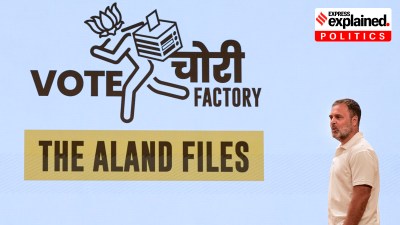India, Pak shake hands on prisoners
India and Pakistan today agreed to release all civilian prisoners and fishermen who have completed their sentence by September 12. The two c...

India and Pakistan today agreed to release all civilian prisoners and fishermen who have completed their sentence by September 12. The two countries also agreed to work out a mechanism for cooperation between the Central Bureau of Investigation (CBI) and the Federal Investigation Agency (FIA) on issues relating to drug trafficking, counterfeit currency and smuggling of explosives.
Both countries also agreed in principle to sign a Memorandum of Understanding on drug trafficking.
The agreements were made during the two-day home secretary-level talks between the two countries that ended here today.
There was, however, no movement forward on the crucial issue of cross-border terrorism. Pakistan stuck to its usual position, denying the presence of terrorist training camps in the country. It, moreover, insisted that India was helping terrorists carry out attacks in Pakistan.
The issue of terrorism, it was learnt, nearly wrecked the talks. The one-page joint statement, the draft of which was given to Pakistan yesterday, was changed several times and was delayed by over four hours. Sources said Indian Home Secretary V K Duggal — heading the Indian delegation — had, at one stage, even threatened to end the talks without a joint statement.
Ultimately, it was agreed that both sides would go only as far as to reiterate the need to combat terrorism ‘‘effectively’’.
The presence of underworld don Dawood Ibrahim and his gang in Pakistan, too, was raised by the government. Pakistan, however, refused to acknowledge Dawood’s presence. It did not even assure India that it would act against Dawood or his aides if they were spotted in Pakistan.
Later, addressing reporters at a joint press conference, Duggal said both sides had agreed to begin the exercise to set free the fishermen and civilian prisoners whose national status had been ‘‘verified’’.
But he refused to specify the number of prisoners who would benefit.
The two countries also agreed to provide immediate notification of the arrests made by either side and give consular access to all arrested persons within three months of arrest.
Later, Pakistan Interior Secretary, Sayed Kamal Shah, visited Tihar Jail to meet two Pakistani prisoners, Mohammed Wasim and Majid, arrested under the Public Safety Act from Jammu and Kashmir.
According to ministry officials the MoU on drug trafficking is likely to be signed during Foreign Minister K Natwar Singh’s visit to Islamabad in October.
Indian diplomats meet Sarabjit
Islamabad: SARABJIT Singh, facing death sentence in Pakistan, on Tuesday gave his personal details and narrated how he was arrested, tried and convicted, to two Indian High Commission officials in Kot Lakhpat jail near Lahore. Sarabjit gave details of his family members during an hour-long meeting with Consular (Visa) Deepak Kaul and Attache (Visa) S C Sharma.
“We had an hour-long meeting with Sarabjit during which he gave his side of the story,” Kaul said, adding that “the tall, lanky and rural man appeared very intelligent and fairly knowledgeable and spoke both English and Hindi well,” Kaul said. Sarabjit was photographed to enable his family to identify him. The details would be sent to India for verification after which his national status would be established before future course of action, Kaul said. —PTI
Photos


- 01
- 02
- 03
- 04
- 05


























